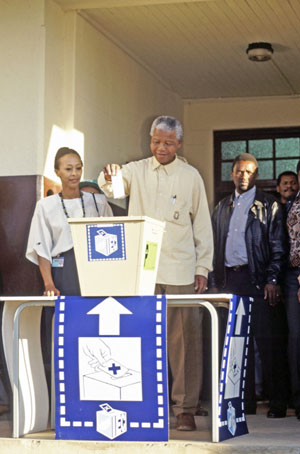Good Governance
Africa has made considerable strides in striving towards democratic and participatory governance, in the context of the African Union (AU) Shared Values ![]() . This is illustrated in various normative frameworks of the Organization of African Unity (OAU)/African Union such as:
. This is illustrated in various normative frameworks of the Organization of African Unity (OAU)/African Union such as:
- the 2000 Solemn Declaration on the Conference on Security, Stability, Development and Cooperation in Africa (CSSDCA)
 ,
, - the 2000 Constitutive Act of the African Union
 , and
, and - the 2007 African Charter on Democracy, Elections and Governance
 .
.

Nelson Mandela, President of the African National Congress (ANC), casting the ballot in his country's first all-race elections on 1 April 1994. UN Photo/Chris Sattlberger.
In the transition from the OAU to the AU, the continent underwent a paradigm shift from the old OAU doctrine of non-interference to the new doctrine of non-indifference to human rights abuses, mass atrocity and crimes against humanity within its Member States.
The African Governance Architecture (AGA) further entrenches fundamental efforts for good governance in the continent. The principal goals of the AGA are to connect, empower and build capacities of AU Organs, Regional Economic Communities and relevant stakeholders, including civil society, in order to enhance good governance and democracy in Africa.
The Africa Governance Platform![]() serves as the dialogue and information-sharing forum, coordination and synergy amongst all the various organs, institutions and the Regional Economic Communities (RECs) on governance, democracy and human rights issues for the achievement of the goals of the AGA.
serves as the dialogue and information-sharing forum, coordination and synergy amongst all the various organs, institutions and the Regional Economic Communities (RECs) on governance, democracy and human rights issues for the achievement of the goals of the AGA.
The African Governance Platform is the coordinating mechanism for the AGA which seeks to monitor the compliance and implementation of AU Shared Values instruments. The Platform is organized around four clusters:
- Constitutionalism and rule of law;
- Human rights and transitional justice;
- Governance and democracy; and
- Humanitarian affairs.
The AU has also initiated a consensus building process to reflect on African experiences on post conflict and reconstruction aiming at establishing an African Transitional Justice Policy Framework, with a view to develop consensus on how the organization can complement the transitional justice capacities of its Member States.
Furthermore, the following documents also contribute to greater convergence and coherent concerted action to enhance the promotion and protection of human rights and peoples’ rights in Africa:
- the African Charter on Human and Peoples’ Rights
 ,
, - the Protocol on the Rights of Women in Africa
 ,
, - the African Charter on the Rights and Welfare of the Child in Africa
 ,
, - the Human Rights Strategy for Africa
 ,
, - the Policy on Post-Conflict Development and Reconstruction
 ,
, - the AU Agenda 2063 and
- the Common African Position on Post-2015 Development Agenda
 .
.
Good Governance and Sustainable Development
Effective governance for sustainable development demands that public institutions in all countries and at all levels be inclusive, participatory and accountable to the people. Laws and institutions must protect human rights and fundamental freedoms. All must be free from fear and violence, without discrimination. We also know that participatory democracy and free, safe and peaceful societies are both enablers and outcomes of de velopment.


